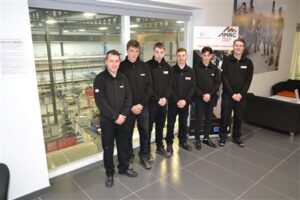The crane and hoist lifting solutions firm, part of the growing SCX Group, whose contracts include retractable roofs for Wimbledon’s Centre and No 1 Courts, is also creating an academy training area at its new workshops.
The initiatives are in line with the ambitions of National Apprenticeship Week – running this week – and the Government, which is allocating an extra £500m to vocational and technical education to train more skilled workers to meet the needs of employers. Chancellor Philip Hammond is due to announce details in Wednesday’s Budget.

The first intake of apprentices into the SCX Academy – photo taken at AMRC in Sheffield
With their performance monitored and assessed at every stage through the ‘Training Passport’, apprentices will emerge after four years with the latest skills and experience of working in all parts of the SCX Group. The starting point for apprentices is six months engineering training at the University of Sheffield’s Advanced Manufacturing Research Centre (AMRC) in Catcliffe, Rotherham – and they continue to study there one day a week as part of their training programme.
“From having just two apprentices on our books, there are now nine, including our first female apprentice,” says Street CraneXpress director Ray Fletcher, who devised the passport.
“By the end of the year there will be a total of 12 or 13. That’s a big undertaking, accounting for over 25% of our workforce. We are seeing rapid growth as a company, and we needed a strategy to address the skills shortage in engineering. It took a lot of time to develop a fully structured training programme, and the fantastic facilities at the AMRC have proved invaluable.”
“Over the past 25 years we have always had one or two apprenticeships running. To allow for continued growth and the issue of succession planning, we felt it absolutely necessary to increase these numbers and improve the structure for the delivery of the training for apprentices. There were not enough engineers coming through. We tried recruiting from elsewhere, but it’s a massive problem. So, two or three years ago the board decided on a plan for the future. When we are fully up and running, it will give us at least two additional qualified engineers a year. We are very satisfied with the way the scheme is progressing.”

Sir Alex Ferguson with Ray Fletcher, director of Street CraneXpress
Street CraneXpress, based in Tyler Street, Wincobank, specialises in electrical travelling overhead cranes and has blue chip clients such as Toyota, JCB, Hitachi Rail and Rolls Royce. It has contracts in a wide range of industries, from steel and glass making to construction and rail to aerospace and nuclear.
Apprentices, mainly school leavers, are taught electrical and mechanical skills in the classroom, in the workshop and on jobs around the country with Street CraneXpress qualified engineers. Although they are attached to Street CraneXpress, they move around the group, picking up experience from attachments to SCX Special Projects, which delivers the Wimbledon roofs, and Burnand XH, which specialises in electronic, electrical, electromechanical and pneumatic control components.
The academy training area will have a mix of old and new equipment to work on, including intentionally faulty crane systems to test the apprentices’ detection skills!
Apprentices are mentored over the four years, with periodic review and appraisals, and ‘graduates’ are to receive an internal diploma. There is currently no recognised national qualification for what they have achieved due to the highly specialised nature of the crane industry. At the end of the four years, apprentices can further enhance their qualifications by attending day release courses at college or university.
“We are investing heavily in time, money and training for apprentices,” says Ray. “With more than a quarter of our workforce as apprentices, it is important that we have a team of experienced engineers willing to mentor them. We are also extremely grateful for the help of the AMRC, which works with us on the selection process.”
One of the current apprentices is based in London, studying locally and coming to Sheffield for the practical training.
Street CraneXpress is looking at placing apprentices in other parts of the country, supported by its satellite engineers dotted around the UK, from Newcastle to London to Wales.